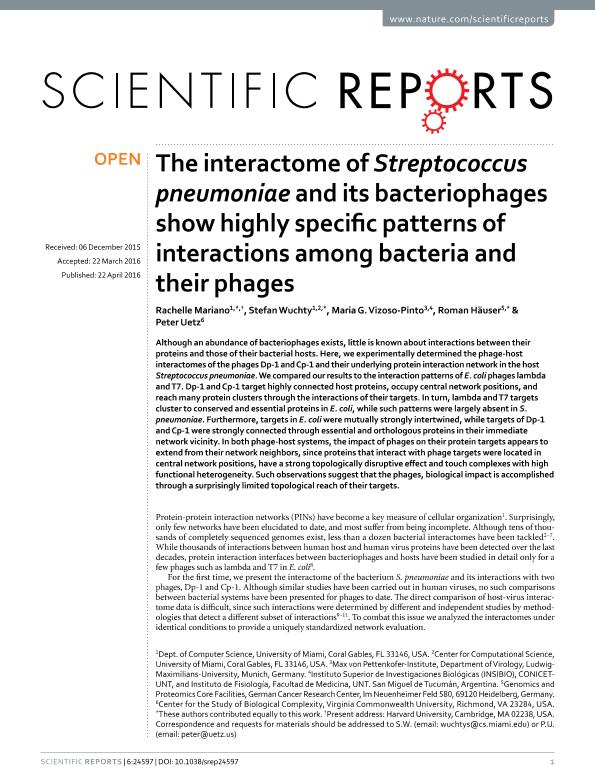Mostrar el registro sencillo del ítem
dc.contributor.author
Rachelle, Mariano
dc.contributor.author
Wuchty, Stefan
dc.contributor.author
Vizoso Pinto, María Guadalupe

dc.contributor.author
Häuser, Roman
dc.contributor.author
Uetz, Peter
dc.date.available
2018-06-29T14:50:41Z
dc.date.issued
2016-04
dc.identifier.citation
Rachelle, Mariano; Wuchty, Stefan; Vizoso Pinto, María Guadalupe; Häuser, Roman; Uetz, Peter; The interactome of Streptococcus pneumoniae and its bacteriophages show highly specific patterns of interactions among bacteria and their phages; Nature Publishing Group; Scientific Reports; 6; 4-2016; 1-10; 24597
dc.identifier.issn
2045-2322
dc.identifier.uri
http://hdl.handle.net/11336/50606
dc.description.abstract
Although an abundance of bacteriophages exists, little is known about interactions between their proteins and those of their bacterial hosts. Here, we experimentally determined the phage-host interactomes of the phages Dp-1 and Cp-1 and their underlying protein interaction network in the host Streptococcus pneumoniae. We compared our results to the interaction patterns of E. coli phages lambda and T7. Dp-1 and Cp-1 target highly connected host proteins, occupy central network positions, and reach many protein clusters through the interactions of their targets. In turn, lambda and T7 targets cluster to conserved and essential proteins in E. coli, while such patterns were largely absent in S. pneumoniae. Furthermore, targets in E. coli were mutually strongly intertwined, while targets of Dp-1 and Cp-1 were strongly connected through essential and orthologous proteins in their immediate network vicinity. In both phage-host systems, the impact of phages on their protein targets appears to extend from their network neighbors, since proteins that interact with phage targets were located in central network positions, have a strong topologically disruptive effect and touch complexes with high functional heterogeneity. Such observations suggest that the phages, biological impact is accomplished through a surprisingly limited topological reach of their targets.
dc.format
application/pdf
dc.language.iso
eng
dc.publisher
Nature Publishing Group

dc.rights
info:eu-repo/semantics/openAccess
dc.rights.uri
https://creativecommons.org/licenses/by/2.5/ar/
dc.subject
Interactome
dc.subject
Phage
dc.subject
Streptococcus
dc.subject
Yeast Two Hybrid
dc.subject.classification
Otras Ciencias Biológicas

dc.subject.classification
Ciencias Biológicas

dc.subject.classification
CIENCIAS NATURALES Y EXACTAS

dc.title
The interactome of Streptococcus pneumoniae and its bacteriophages show highly specific patterns of interactions among bacteria and their phages
dc.type
info:eu-repo/semantics/article
dc.type
info:ar-repo/semantics/artículo
dc.type
info:eu-repo/semantics/publishedVersion
dc.date.updated
2018-06-28T13:56:21Z
dc.journal.volume
6
dc.journal.pagination
1-10; 24597
dc.journal.pais
Reino Unido

dc.journal.ciudad
Londres
dc.description.fil
Fil: Rachelle, Mariano. University of Miami; Estados Unidos. Harvard University; Estados Unidos
dc.description.fil
Fil: Wuchty, Stefan. University of Miami; Estados Unidos
dc.description.fil
Fil: Vizoso Pinto, María Guadalupe. Consejo Nacional de Investigaciones Científicas y Técnicas. Centro Científico Tecnológico Conicet - Tucumán. Instituto Superior de Investigaciones Biológicas. Universidad Nacional de Tucumán. Instituto Superior de Investigaciones Biológicas; Argentina. Ludwig Maximilians Universitat. Max Von Pettenkofer Institute; Alemania
dc.description.fil
Fil: Häuser, Roman. German Cancer Research Center; Alemania
dc.description.fil
Fil: Uetz, Peter. Virginia Commonwealth University; Estados Unidos
dc.journal.title
Scientific Reports
dc.relation.alternativeid
info:eu-repo/semantics/altIdentifier/url/http://www.nature.com/articles/srep24597
dc.relation.alternativeid
info:eu-repo/semantics/altIdentifier/doi/https://dx.doi.org/10.1038/srep24597
Archivos asociados
